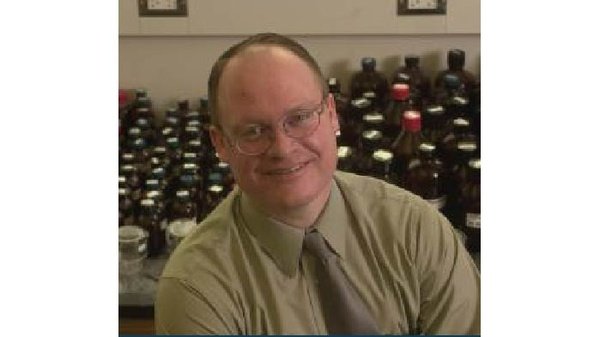Dr. Paul Savage Awarded Reed M. Izatt and James J. Christensen Faculty Excellence in Research Award
Sept. 9, 2010

BYU professor Dr Paul B Savage received the Reed M Izatt and James J Christensen Faculty Excellence in Research Award September 9 at 4 p.m. in W140 BNSN. At this time, he also presented a lecture about his research on the human innate immune system.
“The human innate immune system is tuned to recognize specific threats of infection and respond to infectious agents with lethal force,” Dr. Savage’s lecture abstract reads. “Recognition and response occur at the molecular level, and it is possible to influence and mimic recognition and response with small molecules. One aspect of recognition involves surveillance by natural killer T (NKT) cells for signs of bacterial infection. NKT cells regulate immune reactions to infection and influence disease states ranging from tumor rejection to autoimmunity. Glycolipids from specific classes of bacteria trigger NKT cell responses, which can lead to beneficial or deleterious effects. An understanding of how NKT cells are stimulated by glycolipids is essential to the control of their behavior.”
Dr. Savage manages a large, well-funded research group of undergraduate and graduate students, postdoctoral researchers and technicians, which has discovered many of the types of glycolipids that stimulate NKT cell responses. The group has also “optimized the structures of synthetic molecules that elicit responses from NKT cells at very low concentrations.”
“Many vaccines have been developed that are well designed but lack the ability to generate a protective response in humans,” Dr. Savage wrote in his abstract. “We have demonstrated that NKT cells are uniquely suited for aiding vaccines, and the addition of glycolipids as vaccine adjuvants increases the effectiveness of vaccines dramatically. A compound that has been optimized for NKT cell stimulating properties will enter human clinical trials this year.”
Work in this area with collaborators at the University of Chicago and Scripps Research Institutes has attracted significant scientific interest and has appeared in journals such as Science and Nature. A small company is working to bring the glycolipids developed in Dr. Savage’s laboratory into clinical use. As immunostimulants, the glycolipids aid greatly in the effectiveness of vaccines. The lead glycolipid will enter human clinical trials as a vaccine adjuvant at the end of 2010. If the expected results are observed in the human trials, the immunostimulatory glycolipid could find use in increasing the effectiveness of vaccines ranging from those for the flu to those for herpes to those developed to treat cancer.
By Jessica Henrie and Alexis Hales